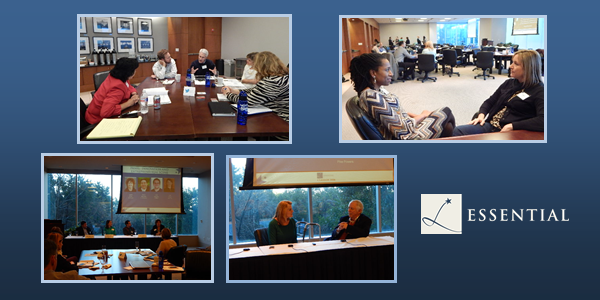
Guest post from Essential 2016 Class participant Ben Loftsgaarden, reflecting on the November 2015 class day on the Austin Economy. Ben is a Partner at Greyhill Advisors.
“Your circumstances can bend your commitment or your commitment can bend your circumstances.”
-Excerpt from Essential class reading, Positive Leadership
Our last Essential class day focused on a discussion of the Economy. In brief, we learned that by nearly every metric Austin is outperforming just about all other metros in the nation. With rock bottom unemployment, companies flocking to our region, rising incomes and growing prosperity Austin is in great shape, right? Not so fast… A “rest on your laurels” mentality is not what has propelled Austin forward and I was not surprised that my fellow classmates wanted to dig deeper on tough issues that, when addressed, will put our community in an even stronger position.
The theme of our class reading was Purpose and I found that this, often unknowingly, permeated our discussion the entire day. As we absorbed information on the economy, workforce, or entrepreneurial climate our conversation moved toward penetrating questions to determine what should be done next. The Austin region has prospered and we all recognize the importance of a healthy and robust economy, but have all our citizens shared in this prosperity? Are we engaging our young students and underserved communities and providing a path for them to participate in the industries that will drive the 21st century? Won’t factors like these have the biggest impact on the health of our current companies, start-ups and Austin’s desirability as a future business location?
Throughout the day we had discussion on many fronts, but a couple stood out for consideration as we move forward:
Social equity is a growing concern in the Austin area. A way to frame the issue might be to determine the true economic impact that social disparity has on the economy in order to elevate this threat and mobilize a broader response. Pike Powers commented that “Place matters” and credited the power of Austin’s identity for much of our economic successes. In light of this, doesn’t deteriorating social equity diminish our quality of place and wouldn’t that have a quantifiable economic cost?
It was clear in our discussion that building social equity is a multi-faceted challenge, but our session provided areas where we can start to take action both as a class and individuals. For example, can we serve as leaders/intermediaries to push the concept of instituting a region-wide internship program? To build scale, a network of businesses and workforce development/education institutions could institutionalize this program with the goal of giving students in underserved communities exposure to careers and mentoring relationships that they would not otherwise have.
How do we fortify the middle class – the bulk of jobs in any well functioning economy?
With the decline of manufacturing jobs, both in Austin and nationally, there is a need to fill the void in middle class employment opportunities that allow participation among a broader base of individuals. Perhaps the IT sector is this generation’s answer to the manufacturing based economy of the last century? We learned a great deal about the growth of IT jobs (60% increase in job openings since 2012) and the ever widening IT jobs gap (1 million unfilled programming jobs).
One intriguing aspect is that many IT jobs are increasingly filled by individuals with just an associate’s degree or certification. It seems that in many ways, the technology jobs of today resemble the manufacturing jobs of previous generations. But, this message doesn’t seem to be getting out to students. We learned that of all graduating AISD students, only 2% had taken a computer science class. This is an obvious misalignment that, when corrected, will have the dual benefit of connecting students with a real world career path while providing a pipeline for our local technology businesses as they address their current IT jobs gap.
We all sense the growing urge for action permeating class discussions. As we continue to build our base of knowledge it is important to take a step back and consider our Purpose and let that direct our actions. On this, we were treated to an effective blueprint conveyed by Pike Powers, one of our city’s most effective leaders. As he shared the details behind the growth of Austin’s economy, what was clear was an unyielding commitment to a Purpose shared by a group of leaders, no matter how long the odds.
We have tremendous power as a collective and I have no doubt that we will do great things as a class, but in the near term I challenge each of us to connect with our individual purpose and let the clarity of that understanding motivate us to action in our own communities.
NOTE: The opinions of Leadership Austin alumni, faculty members, and guest bloggers are their own, and do not represent an official position of the organization

